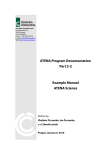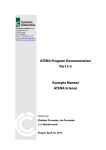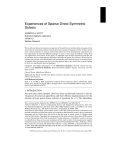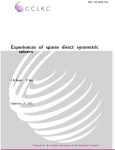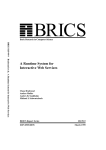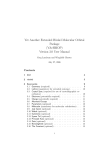Download as a PDF
Transcript
MBDyn Installation Manual Version 1.X-Devel Pierangelo Masarati Dipartimento di Ingegneria Aerospaziale Politecnico di Milano Automatically generated May 18, 2007 Contents 1 Introduction 3 2 Getting the package 2.1 MBDyn . . . . . . . . . . . . . . 2.2 Mathematical Utilities . . . . . . 2.2.1 ATLAS . . . . . . . . . . 2.2.2 BLAS . . . . . . . . . . . 2.3 Linear Solvers . . . . . . . . . . . 2.3.1 Naive . . . . . . . . . . . 2.3.2 Y12 . . . . . . . . . . . . 2.3.3 Umfpack . . . . . . . . . 2.3.4 Lapack . . . . . . . . . . 2.3.5 SuperLU (experimental) . 2.3.6 TAUCS (experimental) . 2.3.7 Harwell (historical) . . . . 2.3.8 Meschach (historical) . . . 2.4 Utilities . . . . . . . . . . . . . . 2.5 Communication . . . . . . . . . . 2.5.1 MPI . . . . . . . . . . . . 2.5.2 Metis . . . . . . . . . . . 2.6 Real-Time . . . . . . . . . . . . . 2.6.1 RTAI . . . . . . . . . . . 2.7 Build Environments . . . . . . . 2.7.1 GNU/Linux . . . . . . . . 2.7.2 Windows: CygWin . . . . 2.7.3 Windows: MSYS/MinGW . . . . . . . . . . . . . . . . . . . . . . . . . . . . . . . . . . . . . . . . . . . . . . . . . . . . . . . . . . . . . . . . . . . . . . . . . . . . . . . . . . . . . . . . . . . . . . . . . . . . . . . . . . . . . . . . . . . . . . . . . . . . . . . . . . . . . . . . . . . . . . . . . . . . . . . . . . . . . . . . . . . . . . . . . . . . . . . . . . . . . . . . . . . . . . . . . . . . . . . . . . . . . . . . . . . . . . . . . . . . . . . . . . . . . . . . . . . . . . . . . . . . . . . . . . . . . . . . . . . . . . . . . . . . . . . . . . . . . . . . . . . . . . . . . . . . . . . . . . . . . . . . . . . . . . . . . . . . . . . . . . . . . . . . . . . . . . . . . . . . . . . . . . . . . . . . . . . . . . . . . . . . . . . . 4 4 4 4 5 5 5 5 6 6 6 6 6 6 6 6 6 6 7 7 7 7 7 7 3 Building 3.1 Configuring . . . . . . . . . . . . . . . 3.1.1 Option List . . . . . . . . . . . 3.1.2 Multithread Assembly/Solution 3.1.3 Schur Parallel Solver . . . . . . 3.1.4 Real-Time Simulator . . . . . . . . . . . . . . . . . . . . . . . . . . . . . . . . . . . . . . . . . . . . . . . . . . . . . . . . . . . . . . . . . . . . . . . . . . . . . . . . . 8 8 8 9 9 10 1 . . . . . . . . . . . . . . . . . . . . . . . . . . . . . . . . . . . . . . . . . . . . . . 4 Installing 5 Executing 5.1 Regular Execution . 5.2 Parallel Execution . 5.3 Real-Time Execution 5.4 External Execution . 11 . . . . . . . . . . . . . . . . . . . . . . . . . . . . . . . . . . . . . . . . . . . . . . . . . . . . . . . . . . . . . . . . . . . . . . . . . . . . . . . . . . . . . . . . . . . . . . . . . . . . 6 Troubleshooting 7 HOWTOs 7.1 Run-Time Modules . 7.2 Schur Solver . . . . . 7.3 Real-Time Simulator 7.4 Simulink Interface . 12 12 12 12 12 13 . . . . . . . . . . . . . . . . . . . . . . . . . . . . . . . . . . . . . . . . . . . . . . . . . . . . . . . . . . . . . . . . . . . . . . . . . . . . . . . . . . . . . . . . . . . . . . . . . . . . 14 14 15 17 18 8 Developers 20 8.1 Prepare for Building . . . . . . . . . . . . . . . . . . . . . . . . . 20 2 Chapter 1 Introduction This document describes how to download, build, install and execute MBDyn — MultiBody Analysis program, a suite of tools for multibody/multidisciplinary analysis of complex systems. For any question or problem, to fix typos, bugs, for comments and suggestions, please contact the Development Team without hesitation: Pierangelo Masarati, MBDyn Development Team Dipartimento di Ingegneria Aerospaziale Politecnico di Milano via La Masa 34, 20156 Milano, Italy Fax: +39 02 2399 8334 E-mail: [email protected] Web: http://www.aero.polimi.it/~mbdyn/ This document is also available online at http://mbdyn.aero.polimi.it/~masarati/MBDyn-input/install/ 3 Chapter 2 Getting the package 2.1 MBDyn The package can be downloaded in source form from http://mbdyn.aero.polimi.it/~mbdyn/ Binary releases and snapshots are also available for Windows 2000/XP at http://mbdyn.aero.polimi.it/~masarati/Download/mbdyn/, compiled with Cygwin (see http://www.cygwin.com/) and thus require cygltdl-3.dll; they are provided to Windows users to save them the burden of installing Cygwin (very easy and straightforward, though) and to compile a package under an unfamiliar environment. However, no support is provided for those builds, unless problems are easily identifiable as related to the sources and not to the OS, and they impact the UN*X version as well. MBDyn may use a wide range of packages, if available on the host system and correctly detected by configure. 2.2 Mathematical Utilities MBDyn may exploit the availability of some mathematical utilities; neither of them is required for a basic compilation, but they may be useful or required for specific features. 2.2.1 ATLAS The Automatically Tunable Linear Algebra Subroutines are a replacement of the standard BLAS. They are exploited by the linear solver Umfpack (see Section 2.3.3) and can be used by Lapack (see Section 2.3.4) and other packages that require BLAS (see Section 2.2.2). Note that ATLAS provides its own implementation of Lapack but only for a limited set of functions. This set of functions is packed into an archive called 4 liblapack.a, so in typical installations it may shadow complete implementations of the Lapack package. A useful “trick” to have a complete Lapack installation that exploits ATLAS performances where available is described in http://math-atlas.sourceforge.net/errata.html#completelp. The essential instructions are reported below, assuming that $ATLAS and $LAPACK respectively are the paths to your ATLAS and Lapack static library archive files: mkdir tmp cd tmp ar x $ATLAS/liblapack.a cp $LAPACK/liblapack.a $ATLAS/liblapack.a ar r $ATLAS/liblapack.a *.o cd .. rm -rf tmp 2.2.2 BLAS The Basic Linear Algebra Subroutines can be used by Umfpack (see Section 2.3.3) and other packages. Specially tuned binaries for each architecture (processor type, cache size and other special hardware features) are advisable; otherwise, instead of compiling them of your own, ATLAS (see Section 2.2.1) are considered a better replacement. 2.3 Linear Solvers MBDyn may use a variety of linear solvers 2.3.1 Naive The Naive solver is also native. It is especially meant for medium size problems (between 100 and 1000 unknowns) and is essentially a sparse solver optimized for speed rather than memory usage. 2.3.2 Y12 The Y12 solver is also built-in. the MBDyn Project distributes the Y12 library AS IS and WITHOUT ANY WARRANTY as part of the source code, with no copyright statement and no license. Of course credits go to the original Authors: Zahari Zlatev, Jerzy Wasniewski, and Kjeld Schaumburg, Comp. Sci., Math. Inst., University of Aarhus, Ny Munkegade, DK 8000 Aarhus. This solver is recommended for moderate to large problems, if Umfpack (see Section 2.3.3) is not available. 5 2.3.3 Umfpack The Umfpack linear sparse solver library must be downloaded separately, from http://www.cise.ufl.edu/research/sparse/umfpack/. Credit goes to Timothy A. Davis, University of Florida. Umfpack is used by permission; please read its Copyright, License and Availability note. It is used as the standard sparse solver by MATLAB (see http://www.mathworks.com/). This solver is recommended for very large problems, and as a general purpose solver. 2.3.4 Lapack 2.3.5 SuperLU (experimental) 2.3.6 TAUCS (experimental) 2.3.7 Harwell (historical) 2.3.8 Meschach (historical) 2.4 Utilities 2.5 Communication 2.5.1 MPI 2.5.2 Metis Metis is a package that performs automatic domain decomposition. It is used by the Schur solution manager to partition the model into submodels of nearly equal computational cost and with minimal interface size. Its compilation is straightforward. It can be downloaded from http://www-users.cs.umn.edu/~karypis/metis/metis/. Its compilation for MBDyn used to require a special patch to cleanup its namespace; now the patch is no longer required as a better namespace separation has been operated. No installation procedure is provided as of version 4.0; at the end of compilation, the library libmetis.a is available in the build tree, and it should be copied to a directory where the loader can locate it; the headers Lib/*.h should be copied where the C preprocessor can locate them. 6 2.6 2.6.1 2.7 2.7.1 Real-Time RTAI Build Environments GNU/Linux The preferred build environment is GNU/Linux, using gcc, g++ and either g77 or gfortran. 2.7.2 Windows: CygWin MBDyn has been successfully compiled under CygWin. No special requirement is known. Special attention is required to build with some specific feature, significantly run-time loadable modules. 2.7.3 Windows: MSYS/MinGW MBDyn has been successfully compiled under MSYS/MinGW. Special attention needs to be played to what version is used. Download packages from http://www.mingw.org/. Required packages (in order of installation): • MinGW-3.1.0-1.exe (install wizard) • MSYS-1.0.10.exe (install wizard; if not automagically done, edit file /etc/fstab as indicated in MSYS’ documentation) • msysDTK-1.0.1.exe (install wizard) • gcc-core-3.4.2-20040916-1.tar.gz (archive; untar after changing directory into /mingw) • gcc-g++-3.4.2-20040916-1.tar.gz (archive; untar after changing directory into /mingw) • gcc-g77-3.4.2-20040916-1.tar.gz (archive; untar after changing directory into /mingw) • msys-libtool-1.5.tar.bz2 (archive; untar after changing directory into /) 7 Chapter 3 Building The configuration of the MBDyn package is based on GNU’s autotools (see http://www.gnu.org/ for details). 3.1 Configuring 3.1.1 Option List Specific options (from configure --help): --enable-debug enable debugging (no) --with-debug-mode[={none|mem}] with debug mode {none|mem} (none) --enable-socket-drives enable socket drives (auto) --enable-runtime-loading enable runtime loading (auto) --with-static-modules build (known) modules as static (auto) --enable-crypt enable crypt (deprecated) (no) --enable-schur enable Schur parallel solver (needs MPI and either Metis or Chaco) (auto) --enable-multithread enable multithread solution (no) --enable-adams enable MSC.ADAMS output (no) --enable-motionview enable Altair’s Motion View output (no) --with-tcl with tcl interpreters (auto) --with-libf2c[={f2c|g2c}] with f2c library (auto) --with-fs[={unix|dos}] filesystem type (unix) --with-mpi with MPI support (=pmpi for profiling) (auto) --enable-debug-mpi enable MPI debugging (no) --with-metis with Metis model partitioning support (auto) --with-threads with threads (auto) --with-rtai with RTAI support (no) math libraries: --with-blas --with-goto=lib(s) --with-ginac with (C)BLAS math library (auto) with Goto BLAS implementation with GiNaC support 8 (ginac-config must be in $PATH) (auto) linear algebra solvers (naive is enabled by default): --with-y12 with Y12 sparse math library (yes) --with-umfpack with Umfpack math library (auto) --with-lapack with LAPACK math library (auto) --with-hsl with HSL (Harwell) sparse math library - historical (auto) --with-meschach with Meschach math library - historical (auto) --with-superlu with SuperLU math library - eXperimental (auto) misc security libraries: --with-pam with PAM support (auto) --with-sasl2 with Cyrus SASL2 support (auto) supported features: --with-struct with structural elements (yes) --with-elec with electric stuff (yes) --with-aero with aerodynamic stuff (yes) --with-aero-output={std,gauss,node} aerodynamic output mode (auto) --with-hydr with hydraulic stuff (yes) --with-module=<list> 3.1.2 build listed modules (see modules/) Multithread Assembly/Solution The switch --enable-multithread enables multithreaded assembly; it defaults to auto, i.e. if the system meets the following requirements, it is automatically enabled. Essentially, a working -lpthread library and a POSIX compliant pthread.h header must be available. Currently, only the SuperLU sparse threaded solver is available; it is experimental. A threaded implementation of the built-in naive sparse solver is under development. 3.1.3 Schur Parallel Solver The Schur parallel solver is enabled by using the switch --enable-schur. It requires a working MPI library with the ch driver and the C++ interface, and a partitioning library. The MPI library is selected by the switch --with-mpi, which allows to specify the value pmpi if the profiling version of the library is to be used. Note that recent MPI releases by default only build the profiling version of the C++ library, so the pmpi value is mandatory. Currently, the only partitioning library that is supported by MBDyn is METIS; a patch to support Chaco is being incorporated, and may be available in future releases. The Schur solver is not compatible with the multithreaded assembly/solution, so if no switch is specified and the system meets the requirements for both, the multithreaded assembly wins over the Schur solver. As a consequence, the schur solver should be explicitly enabled. 9 3.1.4 Real-Time Simulator The real-time simulator is enabled by using the switch --with-rtai, which essentially detects the availability of the mandatory headers of the GNU/Linux Real-Time Application Interface. These headers changed between 2.4.13 and 3.X; both versions are automatically detected. 10 Chapter 4 Installing Run make install; this essentially installs the binary, the utilities, the man page and the dynamic modules, if any. 11 Chapter 5 Executing Prepare an input file and run mbdyn -f <input> -o <output>. 5.1 Regular Execution 5.2 Parallel Execution 5.3 Real-Time Execution 5.4 External Execution To run MBDyn as a Simulink module, use the SimulinkInterface that is available under contrib/. 12 Chapter 6 Troubleshooting 13 Chapter 7 HOWTOs This chapter contains mini-howtos about typical significant configurations of MBDyn as performed by the developers. Feel free to contribute your own if you had to do any unusual configuring to meet special needs. 7.1 Run-Time Modules To enable run-time loading of modules, a powerful means to extend MBDyn functionality, one needs to: • install, and let MBDyn detect, the ltdl library, an ancillary library of libtool that handles platform-independent run-time loading of software modules; • enable run-time loading of modules; this requires to configure MBDyn with --enable-runtime-loading; • when using gcc, it is recommended to add -rdynamic to the LDFLAGS environment variable; this is required to make functions and objects provided by MBDyn available in the modules; • when developing a custom module, it must be placed in a subdirectory of the directory modules/, named module-name/. The module should be contained in one file, with the same name of the directory plus the language-specific extension; this should be – C: module-name.c; – C++: module-name.cc; – Fortran 77: module-name.f. • the building of each module must be explicitly enabled; this requires to configure with --with-module=list, providing a list of the module names (without the leading module-). 14 For example, to enable run-time loading and to build the wheel2 module, use $ ./configure --enable-runtime-loading --with-module=wheel2 Occasionally, one may want to statically build some well-known modules into MBDyn, specifically those that implement new elements. This requires to configure with --with-static-modules. After that, the user-defined elements are available as joints. Currently, only the wheel2 module can be statically built into MBDyn; this feature will require some reworking. Run-time loading of dynamic modules is known to work on any flavor of GNU/Linux on X86/X86 64 and on Windows using Cygwin, when compiled with gcc. It may work on other architectures and with other compilers, but it has not been tested by, nor reported to, the Developers. 7.2 Schur Solver This section describes how the Schur parallel solver available within the MBDyn package has been successfully compiled and executed on a dual Athlon SMP machine. By no means it is intended to suggest how the related packages should be built for other purposes, nor it may represent a replacement for the original build and install procedures. Please refer to the documentation available with each package for more details or for troubleshooting. Software prerequisites: • gcc/g++/g77 >= 3.0 (tested with gcc/g++/g77 3.2.1, 3.3.1 and 3.4.0) Software requirements: • MBDyn 1.2.1 • mpich 1.2.5.2 • Metis 4.0 MPI • download mpich.tar.gz from http://www-unix.mcs.anl.gov/mpi/ • untar the package in a temporary directory • configure the package with $ ./configure -rsh=ssh --disable-f77 --prefix=/usr/local/mpich • make the package • make install • edit /usr/local/mpich/share/machines.<arch> to enumerate the max number instances of the MBDyn process you want to allow on each machine; in my case <arch> is LINUX (more details in /usr/local/mpich/doc/mpichman-chp4.pdf). 15 Metis • download XXX from http://www-users.cs.umn.edu/~karypis/metis/metis/ • untar it in a temporary directory • apply the patch metis-namespace-cleanup.patch from http://mbdyn.aero.polimi.it/~masarati/Download/mbdyn/ • make the package • ... • copy the library libmetis.a in /usr/local/lib and the header files defs.h, macros.h, metis.h, proto.h, rename.h and struct.h in /usr/local/include/metis. MBDyn • download mbdyn-1.2.1.tar.gz from http://mbdyn.aero.polimi.it/~masarati/Download/mbdyn/ • untar it in a temporary directory • make sure the compiler can find headers from MPI and Metis by defining CPPFLAGS="-I/usr/local/mpich/include \ -I/usr/local/mpich/include/mpi2c++ \ -I/usr/local/include/metis" • make sure the linker can find the libraries from MPI and Metis by defining LDFLAGS="-L/usr/local/mpich/lib \ -L/usr/local/lib" • configure MBDyn by running $ ./configure --with-mpi=pmpi --with-metis --enable-schur \ --prefix=/usr/local • make the package • make install the package Run It! To test the system, one needs a test input file; the example cantilever2 from http://www.aero.polimi.it/~mbdyn/documentation/examples/ should do the trick. The input file does not need any specific change, unless special features are required. To run it on an SMP machine, simply execute $ /usr/local/mpich/bin/mpirun -np 2 mbdyn -f cantilever2 -o /tmp/ -ss This generates a set of files /tmp/cantilever2.0.* and /tmp/cantilever2.1.* with the outputs from processes 0 and 1. 16 7.3 Real-Time Simulator This section describes how the Real-Time simulator available within the MBDyn package has been successfully compiled and executed. By no means it is intended to suggest how the related packages should be built for other purposes, nor it may represent a replacement for the original build and install procedures. Please refer to the documentation available with each package for more details or for troubleshooting. Software prerequisites: • gcc/g++/g77 >= 3.0 (tested with gcc 3.3.1 and 3.4.0) Software requirements: • MBDyn 1.2.1 • RTAI 3.0 RTAI • download rtai-3.0.tar.gz from http://www.rtai.org/ • untar the package in a temporary directory • configure the package with $ ./configure • make the package • make install MBDyn • download mbdyn-1.2.1.tar.gz from http://mbdyn.aero.polimi.it/~masarati/Download/mbdyn/ • untar it in a temporary directory • make sure the compiler can find headers from RTAI by defining CPPFLAGS="-I/home/realtime" • configure MBDyn by running $ ./configure --with-rtai • make the package • make install the package 17 Run It! To test the system, one needs a test input file; the example RT-MBDyn/pendulum from http://www.aero.polimi.it/~mbdyn/documentation/examples/ should do the trick. Simply execute $ mbdyn -f pendulum -ss ... 7.4 Simulink Interface This section describes how the Simulink Interface available within the MBDyn package has been successfully compiled and executed. By no means it is intended to suggest how the related packages should be built for other purposes, nor it may represent a replacement for the original build and install procedures. Please refer to the documentation available with each package for more details or for troubleshooting. Software prerequisites: • gcc/g++/g77 >= 3.0 (tested with gcc 3.3.1 and 3.4.0) • Matlab/Simulink (tested with XXX) Software requirements: • MBDyn 1.2.1 MBDyn • download mbdyn-1.2.1.tar.gz from http://mbdyn.aero.polimi.it/~masarati/Download/mbdyn/ • untar it in a temporary directory • configure MBDyn by running $ ./configure • make the package • make install the package • in directory contrib/SimulinkInterface, edit the file Makefile such that the appropriate mex compiler is used; in my system it is /opt/matlab/bin/mex • make the package 18 Run It! To test the system, one needs a test input file; the example pendulum in the subdirectory examples should do the trick. • start Matlab • add the subdirectory contrib/SimulinkInterface to Matlab’s path, by executing > path(’<path/to>/contrib/SimulinkInterface’, path); • execute simulink by clicking on the related icon, or by running > simulink • open the model by clicking File->Open on the menubar • run the model by clicking Simulation->Start on the menubar. some times, the first run fails; we’re still trying to track that down. In case, just try again... • for more details on creating your own model, or on editing the interface parameters, refer to the README in contrib/SimulinkInterface • an analogous interface with Scicos is under development. 19 Chapter 8 Developers 8.1 Prepare for Building Developers need to prepare the build environment by running $ ./bootstrap.sh This need appropriate versions of the autotools: • automake: there seems to be no special version requirement; • autoconf: there seems to be no special version requirement; • libtool: needs to be at least version 1.5. 20 Bibliography 21























